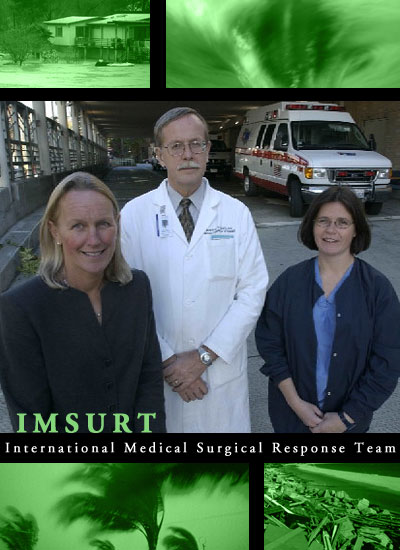
| Community Service | ||||||||
|
Ready to Respond to Disasters |
||||||||
Those are the sorts of disasters for which Dr. Ronald Maier and his International Medical Surgical Response Team (IMSURT) are preparing. Maier, a UW professor of surgery, is leading the creation of an IMSURT group at Harborview Medical Center, where he is chief of surgery. IMSURT was started under the federal Department of Homeland Security in 2003 to form teams of surgeons and other health care professionals ready to respond to man-made and natural disasters in the United States and abroad. Harborview was selected as one of three hospitals in the country to host a team, with the entire Pacific Rim as its area of responsibility. The teams will be trained to deploy with less than 16 hours notice to provide triage and advanced medical care at or near the scene of a disaster. The Harborview program has had about 30 applicants so far, Maier said, and is working towards building a full team of emergency health-care providers. Most of the applicants are from Harborview, he said, but some are from other hospitals in Washington and Oregon. "We have the leadership in place and need to identify qualified individuals who are willing to travel to disaster sites, with very little notice, and help communities in need of critical health and medical services," Maier said. Volunteers will receive training and will be issued special passports to allow them to deploy rapidly in a crisis. Leave from work will be handled much like time off granted for military service. When complete, the team will have between 60 and 100 doctors, nurses, pharmacists, respiratory therapists, clinical engineering staff, and other support staff. The doctors will include emergency medicine specialists, surgeons, anesthesiologists, orthopedic surgeons, infectious disease experts, and tropical medicine specialists. "We need to have three to four people for every position, just in case someone's unable to deploy in the event of a crisis," Maier explained. The team will have access to a portable surgical hospital that can be airlifted to the scene of a disaster. The portable hospital provides a sterile, fully functional work environment. Training has already begun. Some of the team's members practiced deployment at McCord Air Force Base in Tacoma, Wash. Part of the team also has traveled to Boston for a joint training exercise with their counterparts at Massachusetts General Hospital. Two major, weekend-long practice sessions planned for the coming months, Maier said, will give team members a taste of what a real deployment would be like. Harborview, noted for skill in responding to emergencies, was a logical choice for hosting a disaster response on the West Coast. "As the only Level I trauma center for the region, we believe that Harborview is especially well-suited to respond to critical incidents that require triage and specialized trauma intervention," Maier said. "If a disaster occurs, we can mobilize massive teams of caregivers." The hospital staff is well versed in many areas of crisis response, such as communication between emergency personnel. "We continually work on communications issues in the event of a disaster," Maier said. In addition, IMSURT volunteers must be on-call, all the time. Harborview personnel are accustomed to this around-the-clock readiness. "The institution works on the principal that everyone is on-call, 24 hours a day, seven days a week," Maier said. "If I'm in town, I'm on call. Everyone at the institution has that mindset." IMSURT was originally conceived to treat American casualties of overseas incidents, but has since been expanded to be called on for any type of international disaster or homeland crisis. |
||||||||
|
© 2003 - 2004 UW Medicine
Maintained by UW Health Sciences and Medical Affairs News and Community Relations Send questions and comments to drrpt@u.washington.edu |
||||||||


